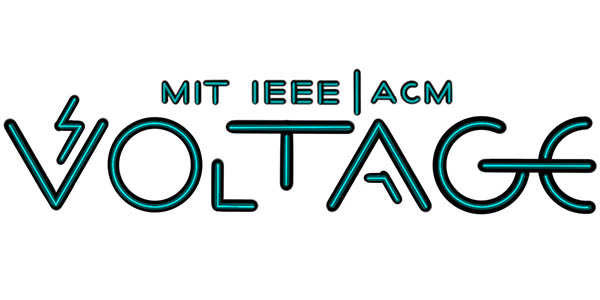

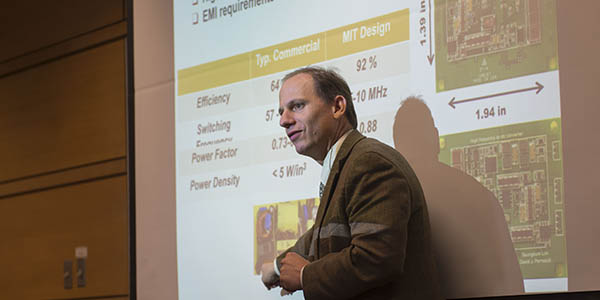
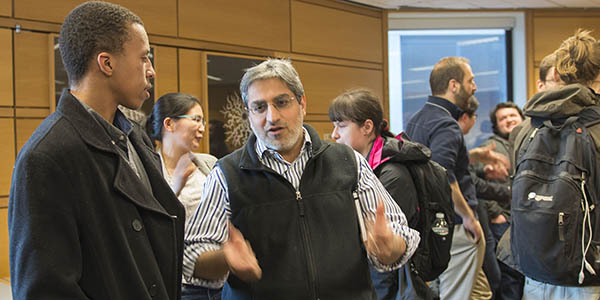
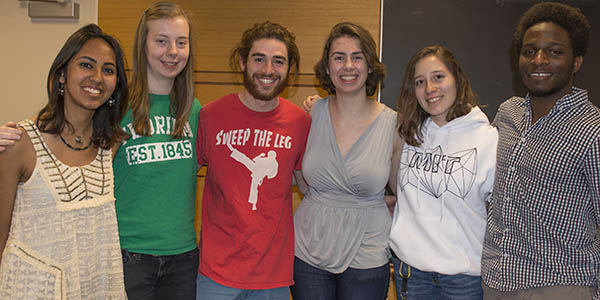

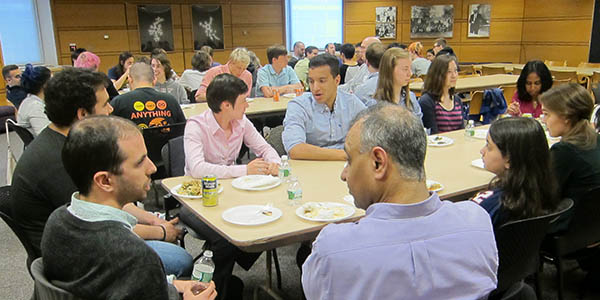
Course 6-1 (Electrical Engineering) students organize to build community
The members of Voltage, a new group in MIT’s Electrical Engineering and Computer Science Department, want to interest more freshmen and Course 6 students in the field of Electrical Engineering (EE). Sponsored by MIT IEEE/ACM, the group is working to build a cohesive network for students in both the EE degree program (6-1) as well as for students leaning to EE in the EECS degree program (6-2) — offering support and resources in academics, research and careers.
“Because there are so few of us,” says Neerja Aggarwal, Course VI junior, “it’s easy to get lost in the sea of Course 6.” She notes that due to the size of the department (now at 1,450 undergraduates), it’s challenging for freshmen and newly declared Course 6-1 and 6-2 majors to find the resources they need. Aggarwal, who switched from Course 3 in her sophomore year, adds that the group wants to create a smaller department feel for this segment of EECS.
The Voltage organizing group, including Aggarwal, Nick Arango, Julia Belk, Sarah Hensley, Paul Kalebu, Allison Lemus, Fiona Paine, and Malika Shahrawat, began to meet as a subcommittee of the MIT IEEE/ACM last January during IAP. Their first large group event held on April 1, the IEEE Voltage Research Expo, featured seven EE faculty who talked about their research. The organizers’ goal was to expose students to the breadth and opportunities in EE at MIT and help them find a faculty research match, noted Julia Beck, who worked with Aggarwal to head the event. More than 80 students — from all years and not just Course 6 — came to the Expo presentations, which were followed by serious and fruitful networking between students and speakers.
Associate Professor Dana Weinstein was impressed with the interest and initiative taken by the 6-1 students. “The Voltage group has taken initiative to develop a real community among students in EE,” she said. She noted that Voltage is providing a home base for students to explore the depths of Electrical Engineering, which extends far beyond traditional circuits and transistors. “The effort they have put in — both in terms of technical exposure as well as social events — is really refreshing and a much needed asset in the department.”
"You guys did awesome! Colin McDonnell, EECS junior enthused to the Voltage organizers. “This was the greatest student faculty event ever." EECS sophomore Amelia Becker found it really useful as she was trying to make plans to select and apply for a summer UROP.
Professor Karl Berggren was pleased to share projects that would be exciting for the students to learn about and in areas where undergraduates would learn valuable skills. “It was wonderful to see students show such enthusiasm for the ongoing research in electrical engineering. After the event, a number of students approached me to discuss UROPs, and I’ve hired a few for this summer!” he said. “It’s great to see so many bright young people with so much potential (pun intended)!”
The Voltage organizers also want to expose current and future EE students in the department to the attractive market for hardware electrical engineers. “Going to the career fair, it’s very easy to get sucked into the software world,” Aggarwal said. So the Voltage organizers are building a list of Course 6-1 alumni from the classes of 1976 to 2005 who have worked in consulting, robotics, integrated circuits and venture capital and who are interested in sharing their experiences with new and continuing Course 6-1 students.
At their first student/alumni dinner held on April 21st, 6-1 students and interested freshmen shared an evening of supper and round-robin conversations about all things electrical engineering with six Course 6 alumni. This and future mixers with alumni are meant to expose students to a wide variety of career paths open to electrical engineers — extending beyond hardware to venture capital and startups.
Kat Kononov, ’12, a member of the technical staff at Lincoln Laboratory was pleased to share her experience with current undergrads and catch up with several fellow alumni. In particular, she was impressed that three women are heading the Voltage organization. “We are so vastly underrepresented in 6-1…it felt so discouraging at times to be the only girl in a class,” she said. “If I can show up and be an example of success to one of them, my day is made.” [The most recent numbers for AY2016 indicate 50% of the students declaring 6-1 are women.]
Roozbeh Ghaffari, ’01, MEng. ’03, PhD ’08, co-founder and VP of Technology at MC10 Inc. a Cambridge-based company that adapts stretchable electronics to extend human capabilities, was thrilled to spend the evening with the students. “It became clear right away that many students are excited about their UROP and SuperUROP research projects,” he said. “The Voltage event highlighted these activities for me directly from the student's perspective — in ways that would not have been possible over the phone or from a website.” He also found it exciting that students were very interested in innovation and startups.
EECS Associate Department Head David Perreault points to the need for electrical engineers: “Electrical Engineering is the key to addressing the challenges we face as a society — ranging from energy to human health — and it is critical to advancing all of the technology we rely on.”
Having encouraged the Voltage organizers as they planned the Research Expo event, Perreault notes the tremendous opportunity for EE students to engage in a wide array of cutting-edge research areas at MIT from nanotechnology to communications to renewable energy. This is matched with a deep, unmet demand in industry for electrical engineers to work in these areas, he says.
“Whenever I travel to visit companies,” Perreault adds, “the number one request is ‘Send us more EE graduates’! With this positive support and potential, Voltage and future 6-1 and 6-2 students have a lot going for them!
As the 2015 spring term ends, the Voltage organizers are already planning for events and activities for fall term including the Voltage Research Expo in February 2016, several alumni dinners each semester and five study breaks over the course of the year.
Research Themes:
News Image:
